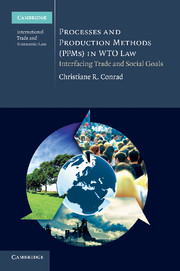Book contents
- Frontmatter
- Contents
- List of figures and tables
- Preface and acknowledgements
- Table of GATT 1947 Reports
- Table of WTO Reports
- List of abbreviations
- Introduction
- I Foundations: the relevance of NPA measures at the interface of domestic regulation, economic globalization and world trade law
- II Legal analysis: reviewing the status of NPA measures de lege lata
- III Outlook: new perspectives on the legal status of NPA measures
- Summary and concluding remarks
- Bibliography
- Index
Introduction
Published online by Cambridge University Press: 05 June 2011
- Frontmatter
- Contents
- List of figures and tables
- Preface and acknowledgements
- Table of GATT 1947 Reports
- Table of WTO Reports
- List of abbreviations
- Introduction
- I Foundations: the relevance of NPA measures at the interface of domestic regulation, economic globalization and world trade law
- II Legal analysis: reviewing the status of NPA measures de lege lata
- III Outlook: new perspectives on the legal status of NPA measures
- Summary and concluding remarks
- Bibliography
- Index
Summary
Freer international trade, fostered by the WTO Agreements, has led to strong economic integration, to growth and to an increase in aggregated global welfare. At the same time, however, political integration has lagged behind. Nation-states, as well as the global community, are facing intensifying social conflicts and pressing environmental problems, such as air and water pollution or climate change. Despite a high degree of international economic integration and an increase in global wealth, global society's problem-solving capacities are rather poor. Views on the extent to which international trade has contributed to these problems diverge considerably. It has been observed that the environmental and social costs of goods production and consumption are hardly ever completely reflected in market prices: thus, goods are traded internationally for prices that do not reflect their true costs, for instance, in terms of pollution, related health damage or other social hardship. While scientists and researchers from different disciplines have been investigating extensively the serious medium- and long-term effects of these neglected costs on the economy, the environment and on humankind, corresponding changes in the global economic systems are not yet conceivable. There are good reasons to believe that, together with technological progress, international trade has enormous potential as a tool to tackle these global problems successfully. However, political stakeholders and society still need to develop sufficient will and capabilities to tap the potential and utilize this tool effectively.
- Type
- Chapter
- Information
- Processes and Production Methods (PPMs) in WTO LawInterfacing Trade and Social Goals, pp. 1 - 6Publisher: Cambridge University PressPrint publication year: 2011

